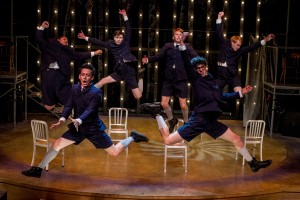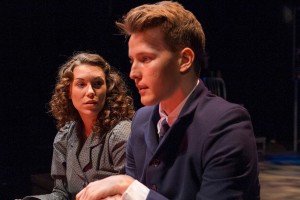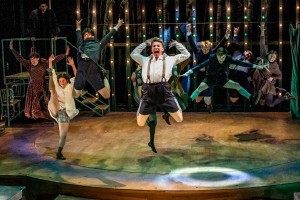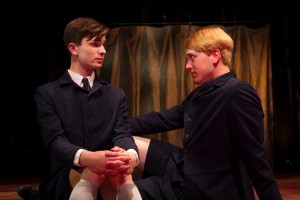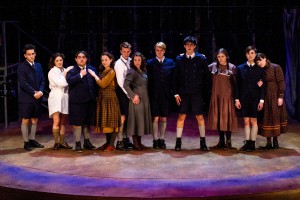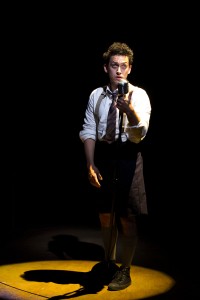A LOT OF YOUTHFUL SPRING BUT LITTLE CHARACTER AWAKENING
Given harsh themes including child abuse, rape, homosexuality, and suicide, one can easily see why Frank Wedekind’s original German play Spring Awakening was initially banned when released; these subjects may be par for the course on the nightly news, but it was pretty hot stuff for Germany in 1891. With book and lyrics by Steven Sater and rock music by Duncan Sheik, we have the version that was anything-but-banned as it hit Broadway in 2005. Any one of those topics could carry a show, but all at once? It’s quite a burden.
Spring Awakening follows a number of adolescents in late nineteenth century Germany as they come to terms with their sexuality at a time when no one will explain anything about it to them. The musical focuses on Melchior (Dave Thomas Brown), Moritz (Charles Evans, Jr.), and Wendla (Taylor Aldrich). Melchior is the intellectual rebel who isn’t buying into the religious or social mores that are being inflicted upon the teens in a boys’ preparatory school. He defends Moritz who anguishes over low grades and bullying by the schoolmaster. Schooled separately from the boys, Wendla is more intellectual and insightful than her schoolmates, longing to study and debate matters of substance, just as Melchior does. All of this occurs as their hormones are driving the teens to distraction.
The players tell each other their woes, but more so, in musical asides, they tell us. Some confessions are the timeless stuff of all teenagers; others truly are tragic. The problem with the book, though, and to a lesser degree in Sean Murray’s direction, is that it feels too much like telling, as compared to showing or implying. With heavy theme after heavy theme − and few of them explored deeply − there isn’t enough opportunity for any one of them to genuinely move us. Scenes that should have had us on the verge of tears don’t; it’s difficult to care for these characters.
The music is a mixed blessing. On the positive side, the voices in Cygnet Theatre’s production are spot-on: From the start, we are drawn in by Aldrich’s stellar voice as she croons “Mama Who Bore Me”; Ilse (Katy Tang) is enthralling with her rich-toned rendition of “Blue Wind”; and the successful energy, harmony, and choreography of the whole company in “Totally FucÄ·ed” brings to mind the joyfully playful “La Vie Bohème” from Rent. There is also a funeral scene that is portrayed beautifully through song. Many things work well with the music.
Conversely, though, the songs also undermine this show. Between the musicians, feet banging, and background vocals, the core lyrics of some songs are difficult to understand. For instance, most of “The Bitch of Living,” other than the chorus, is impossible to make out. Surprisingly, many of Sater’s clearly-heard lyrics are esoteric and not clearly related to the singer’s situation, cutting into our ability to relate to any given character. More significantly, by the fourth time Moritz grabs a mike stand like Buddy Holly and sings out to us about his angst, it’s no longer interesting.
Not having seen the Broadway production, it is difficult to say whether the heavy plot struck a stronger chord in New York or if the production itself made the difference (Lea Michele in the lead female role could not have hurt). Spring Awakening is definitely entertaining, and remains interesting from start to finish with some fine musical work, but it fails to find the touching quality that made Wedekind’s play so universal.
[Editor’s Note: visit here for a 2012 commentary on Spring Awakening.]
Spring Awakening
Cygnet Theatre in Old Town
scheduled to end on April 27, 2014
for tickets, call 619-337-1525
or visit Cygnet Theatre

